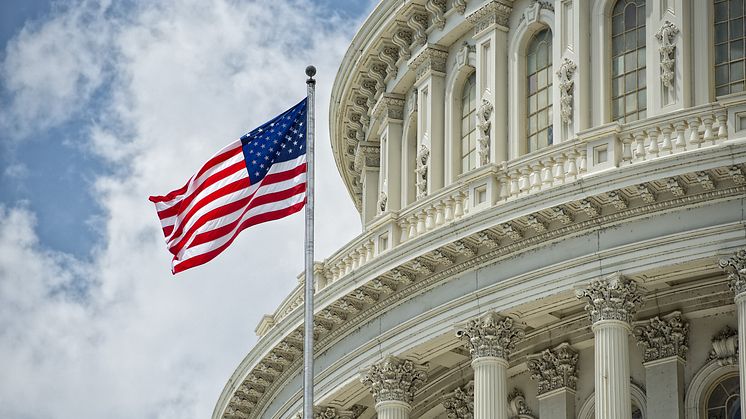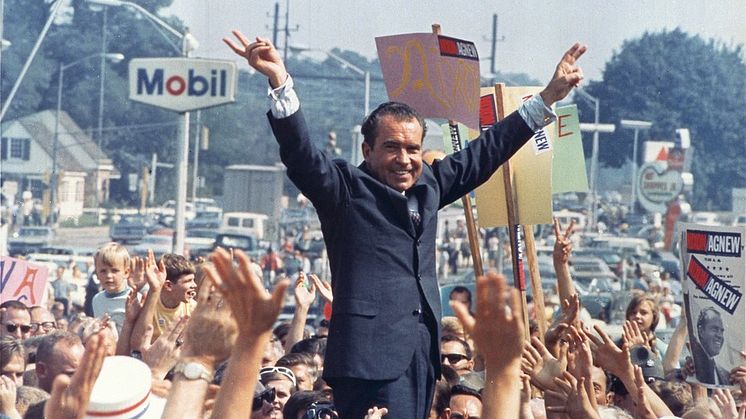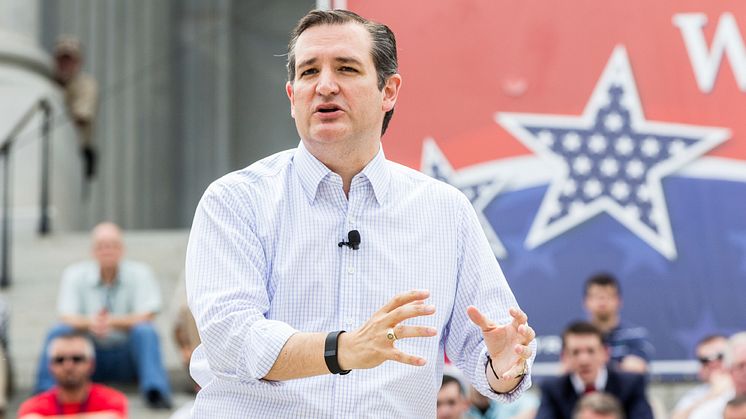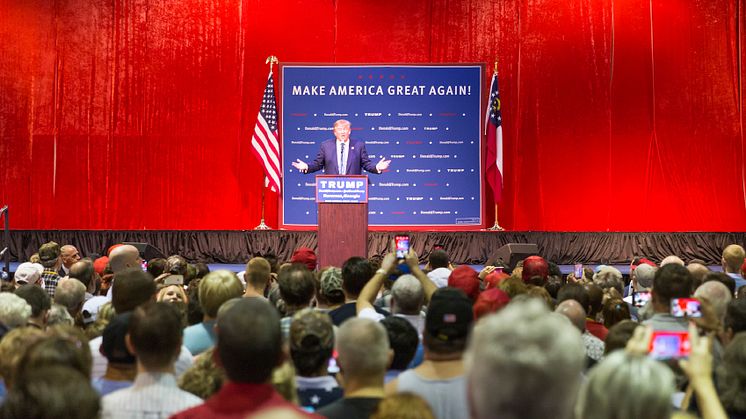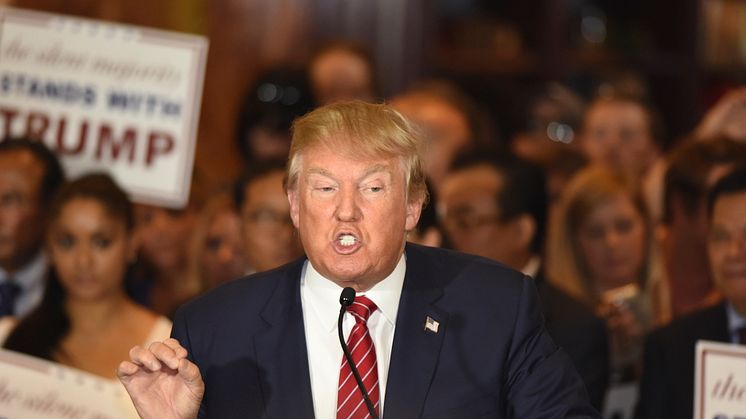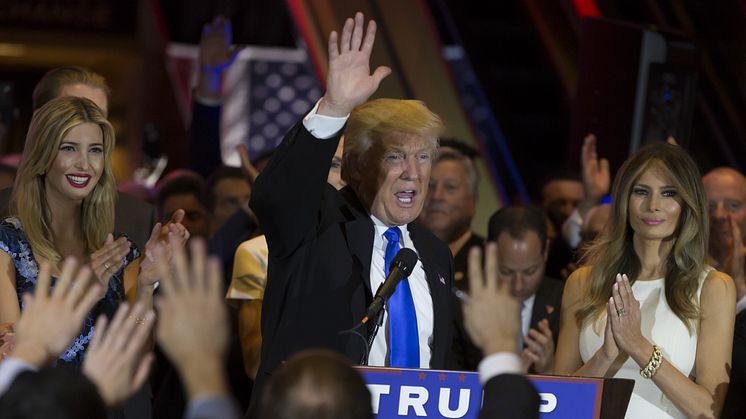
Press release -
Expert reaction: how Trump’s big night unfolded across the US
Brian Ward, Professor in American Studies and Michael Patrick Cullinane, Reader in US History, from Faculty of Humanities at Northumbria report about the US election outcome.
Donald Trump’s triumph stunned the US and the world. So what actually happened on the ground – and what does it all mean? Our panel of experts reflect on what they see in the results.
Shadows over the Sunshine State: report from Florida
Brian Ward, Northumbria University Newcastle
For Democrats, the mood darkened with every red gain in Florida. As Donald Trump consistently outperformed expectations in district after district, their worst nightmares steadily became unpalatable realities.
Alachua County, dominated by the relative progressivism of Gainesville and the University of Florida, went heavily for Hillary Clinton. So, too, did Miami-Dade, Broward, and Palm Beach counties, thanks to a large Hispanic turnout, even though there were signs that many Cuban voters managed to ignore Trump’s anti-Hispanic rants and continued to vote Republican.
That Trump found substantial support in Florida’s more rural districts and had a strong lead among white men without college-level education came as little surprise. What caused the greatest trauma was that significant numbers of college-educated whites – women as well as men – also appear to have favoured the Republican nominee. “Can we revoke their degrees?” quipped one Democratic activist. “Gonna have to investigate some of our colleges,” agreed another.
At one level, such comments reflect precisely the kind of “elite” condescension that Trump has railed against with great success when courting disgruntled blue-collar workers. Here, however, the gallows humour was actually more sombre and contemplative than patronising.

There is a mood not only of disappointment, shock and incredulity – but also of guilt. The Democratic Party and the Clinton campaign somehow failed to persuade large numbers of Floridians that their interests were best served by voting for Hillary Clinton’s more inclusive, progressive vision.
Ultimately, Florida still looks like a mixed bag politically, but the red districts became redder, with much higher than expected turnouts for Trump. Part of the problem, some concluded, was that Clinton simply had too much personal baggage: “Biden would have walked this race,” someone opined, referring to Barack Obama’s vice-president, who nearly jumped into the race in the summer of 2015.
Sitting in a bar long after the Florida vote was declared and it became almost certain that Trump was likely to be the next president, I heard a proudly socialist bartender discussing with a libertarian kickboxing instructor why neither of them could vote for either mainstream candidate. “There was no choice for us,” one explained. “This is rock bottom; payback for putting a black man in the White House. It just sucks.” Outside a truck coasted by with some very happy Trump supporters aboard chanting “USA, USA, USA”.
Fury at the establishment
Gina Reinhardt, University of Essex
Trump’s support has been blamed on factors ranging from misogyny against Hillary Clinton to relative deprivation. But half the nation voted for him – and it’s difficult to believe that half the nation hates women, or that half the nation is suffering from economic decline.
It seems far more likely that anti-establishment sentiment was instrumental in Trump’s success. His supporters have little to no evidence that he is actually good at making decisions, or that he has a solid policy plan – but they are weary of the same old choices. They see Trump as genuine precisely because he seems unrehearsed and espouses unpopular, even taboo opinions. And even if they don’t agree with those opinions, they believe he will shake things up in a world that seems remote and unyielding. They are eager to see what will happen with him in the White House.
Many of Trump’s campaign promises will be difficult to fulfil without congressional support. Building a wall on the border with Mexico will demand enormous funds that the president does not have the power to unilaterally allocate. But there are other ways he can he can change policy. He controls executive agencies, which means he controls whether the Internal Revenue Service enforces tax laws for the wealthy; he can stop enforcement of environmental protection laws and he can block anti-discrimination measures in place to protect employees and potential employees of federal agencies.
Whether he will actually do these things remains to be seen.
A new electoral map
Mark McLay, Glasgow Caledonian University
Although Donald Trump’s surprise win echoes Harry Truman’s shock defeat of Thomas Dewey in 1948, when almost all contemporary commentators expected Truman to lose, the electoral map of Trump’s unexpected victory doesn’t closely resemble any other presidential result in recent American history.
Trump’s success in states such as Ohio, Michigan, and Wisconsin represents a return to the Republican success that Ronald Reagan and George HW Bush enjoyed across that region in the 1980s. Beyond the Upper Midwest, Trump comfortably held onto traditional Republican strongholds in the South, Lower Midwest, and Mountain States that have been safely in the GOP column since 2000. Above all, he grabbed back crucial Florida, which had sided with Obama in 2008 and 2012. With this wide a path to victory, he simply didn’t need votes from the solidly Democratic coastal states.
But the traditional US electoral map hides the main geographic story: the urban-rural divide that proved even more stark than usual. Ever since the industrial revolution in the late 1800s, American politics has seen many battles between city and country over issues of culture, religion and economic interests. Rural white voters came out in record numbers on Tuesday and proved decisive in states such as Florida and North Carolina.
In a nutshell, for all the chatter about a diversifying electorate, Trump’s victory proves that in the right circumstances, white voters – and particularly rural ones – still have the power to overrule the US’s increasingly multicultural cities.
Trump cracks it in the Rust Belt
Michael Patrick Cullinane, Northumbria University Newcastle
Trump’s base came out in the Rust Belt, and then some. The white working men and women of these mid-western states – those left behind by the new economy – made a giant crack in the Democrats’ “blue wall”.
 Pennsylvania for Trump
Pennsylvania for Trump
The so-called “Reagan Democrats” of Pennsylvania’s Erie County, Michigan’s Macomb County, and Wisconsin’s Kenosha county, voted in their droves for Trump. And from suburban Ohio, south-east Michigan, rural Wisconsin and even Manchester, New Hampshire, the nation’s blue-collar voters – formerly employed in steel mills, on automobile assembly lines, in rubber plants or tool factories – made a decision to support a Republican candidate for the first time in nearly a generation.
Clinton’s campaign had taken to calling Michigan, Wisconsin and Pennsylvania her “blue firewall”. But these states clearly favoured Trump’s anti-free trade rhetoric. Pollsters told us that this issue had little impact on traditional Democratic voters – yet, when Bernie Sanders campaigned here in the Democratic primaries, he beat Clinton on these very issues. Young voters on college campuses and African Americans in city centres did not compensate for the surge of white voters for Trump.
The call for change seems to have resonated with this electorate, even if the same mantra elected a Democrat only eight years earlier. Rust Belt voters do not seem to care about Trump’s “hot-mic” boasts of sexual assault, his racist attacks on any number of minorities or his lack of experience in politics. Trump spoke to an emotional impulse, founded on a sense that the establishment experts are wrong, that nationalist pride is worth reviving and that political correctness has had its day. His message obviously mobilised a somewhat silent majority, especially in the Rust Belt. It has opened a new chapter in United States history.
‘Oh, to be great again’: report from North Carolina
David Baker, Coventry University
Here in North Carolina, a battleground state some tipped Clinton to take, Trump won by a comfortable margin. The candidates had been frequent visitors to the state, both holding rallies the day before the vote. The final poll here suggested a one-point gap between Trump and Clinton. Trump ultimately looks to have beaten Clinton here by as many as 125,000 votes, dwarfing Barack Obama’s 2008 margin of 14,000.
Looking at what explains the Trump support, one case in particular exemplifies the issue – the highly controversial HB2 law (the so-called “toilet law”), which denies trans people the right to use the bathroom of their choice. This has brought much opprobrium, from inside and outside the US. North Carolina’s opposition to liberalising the law is seen to be illustrative of conservative “Southern rights”, whereby states push back against federal laws and exert their right to govern as they see fit. That’s something Trump is likely to support and encourage.

North Carolina has also struggled economically, losing jobs 15-20 years ago across traditional manufacturing businesses such as textiles and furniture. It’s a prime example of the classic “job migration” Trump has emphasised throughout his campaign.
And while the recent riots in Charlotte over the police shooting of Keith Scott also highlighted concerns about the state’s black population being left behind as the gap between rich and poor widens, they also stoked fears about law and order – another of Trump’s focus issues.
The feeling is that Obama won the state in 2008 on the basis of a coalition of young voters, black voters and women voters – and that this did not happen this time. It appears that the Republicans have boosted voter numbers substantially compared to 2012.
The state governor was an early champion of Trump and has not wavered in his support. When compared with 2012, early counts suggested that the Democrat vote was down and black voter numbers were also reduced. There have been mutterings from some local Democrats about voter suppression, whereby voter ID requirements are tightened and early voting windows narrowed – another echo from the history of the American south.
This article was originally published on The Conversation . Read the original article.
. Read the original article.
Topics
Categories
Northumbria is a research-rich, business-focused, professional university with a global reputation for academic excellence. To find out more about our courses go to www.northumbria.ac.uk
If you have a media enquiry please contact our Media and Communications team at media.communications@northumbria.ac.uk or call 0191 227 4571.







